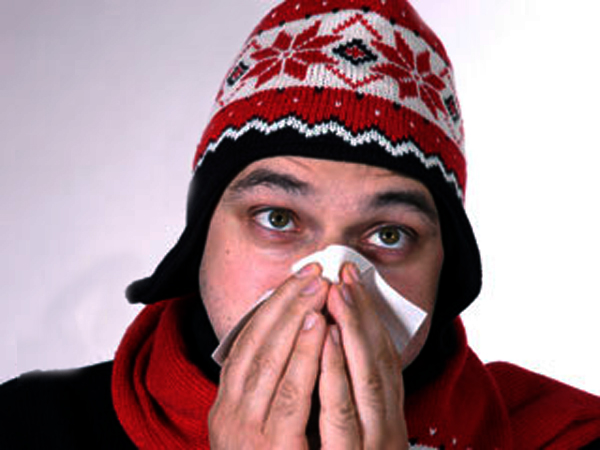Winter is a time when the biosphere in general takes a dormancy period. And so, when it comes to people with allergies also, there is a widely held belief that winter is a time when they are affected the least. Things are not that simple though!

The origin
This myth about allergies being dormant in winter arises out of a partial truth. Since the plants are in a low-activity state, they do not release pollen. This ensures that those with pollen-allergy and ragweed-allergy are allergy-free in winter. Thus began the myth about winter being conducive for all allergies! Since most people stay within homes with warm clothing and electric appliances like heaters and humidifiers running, the myth gets reinforced because the people are less exposed to external air, dust and other outdoor allergens.
The reaction
Most of us are hardwired to trust our gut-feeling or instinct, whatever we may call it. And so, when advised to protect themselves from allergies during the winter, the initial reaction from people can range from suspicion to outright disbelief. The fact that allergies from pollen and ragweed indeed become non-existent during winters does not help matters when it comes to convincing people.
Presenting the facts and figures helps. Knowledge is indeed power when it comes to busting the myths that people hold. Once made aware, majority of the people agree to the fact that winters in fact could be times when one is more prone to allergies. They even take necessary steps to prevent an allergic attack.
The facts
The hard facts about allergies in winter are given below. They prove beyond doubt that winter is a time for extra care and precaution.
- People spend most of the winter time indoors. This will increase their exposure to dust, perfumes, pet dander and indoor molds – all of them allergens.
- Since the air is dry in winters, humidifier usage goes up. Unless perfect care is taken, this could lead to accumulation of moisture in certain pockets of the home where fungus and mold begin to grow. There are deadly allergen creators.
- The heavy clothes, blankets and sheets are taken out for use during winter. Since it is tough to dry them, they are not washed regularly too. This exponentially increases the exposure to dust mites which again are allergy-causing.
- Winters are times when pets get increased access within the home for ‘ who would be so cruel as to freeze a pet?’ Pet dander, another major allergen, increases in the indoor environment where people often remain confined for long periods of time.
- Winters also see a rise in the usage of heaters. This in turn means increased re-circulation of air and thus an increased chance of allergens created at home, remaining in the home.
What do the experts say
The experts are unanimous in their views – winters are high-alert times for allergenic people. They advise preventive measures to nip the allergy in the bud.
Dr. David J. Resnick, working in the Morgan Stanley Children’s Hospital of New York as the director of Allergy and Immunology states that asthma and other respiratory illnesses get worsened in winters when a family spends more time inside, getting exposed to household sprays, dust mites,smoke, pet dander and other chemicals which are all irritants. One susceptible member could also spread it to the other.
Dr John Santilli, MD, who is an allergist and microbiologist in Connecticut opines that the usage of pine trees for Christmas within the home is a source of humidity. The fallen leaves and the moisture lead to increased mold growth and greater chances of allergic attacks.
Quick tips
An allergy specialist from New York-Presbyterian Hospital, Dr. Michael Stewart says that allergies because of mold spores are the main problem in winters for these molds can grow anywhere, in all seasons. The following tips are recommended to keep yourself allergy-free.
- Keep indoor humidity levels below 35 percent to prevent growth of mites and molds. Use exhaust fans to remove the humidity from homes.
- Do not use wall-to-wall carpeting in the bedrooms.
- Use covers over the beds, mattresses and pillows to reduce exposure to allergens.
- Wash the linen and sheets in boiling water to kill the dust mites.
- Minimize contact with pets inside the home.
- Do not make use of potted plants in the bedrooms and living room. IN other places too, make it a point to clear away the fallen leaves.
- Get your vaccination shots before the onset of winter. Consult your doctor or specialist for any special care that has to be taken in winter.




